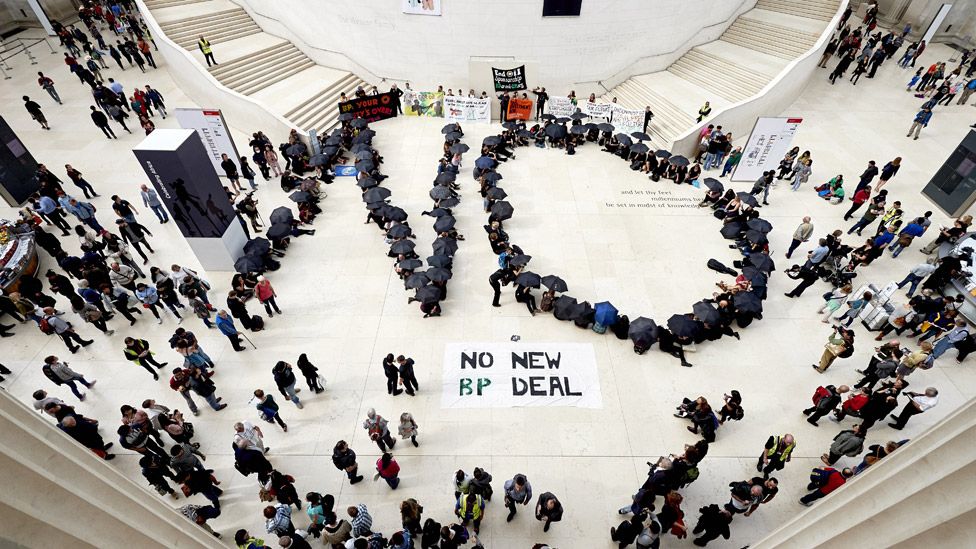Museums must find 'ethical' sponsors
- Published

Museums and galleries will be required to scrutinise the ethical standards of companies that provide sponsorship in the future under new rules.
Some museums have been criticised for deals with companies like BP and Shell.
The rules are in the new Museums Association ethical code, which has been approved at its annual conference.
It does not say museums should avoid any specific types of company, but does say museums must find sponsors who share their "ethical values".
It also says sponsors should not exert influence over the contents of exhibitions.
In May, Shell was accused of trying to influence the Science Museum in London when it sponsored a climate science gallery. The oil giant and the museum both said the museum retained full editorial control.
Campaigners have also protested against BP's sponsorship of institutions including the British Museum and Tate since the Gulf of Mexico oil spill in 2010, saying BP is trying to buy "cultural power" to improve its corporate image.
The Tate has said BP's sponsorship "fits in" with its "ethical policy".
Museums Association (MA) president David Fleming told the conference in Birmingham: "Scrutiny by the public of sponsorship and where we get our money from is not going to go away.
"It's extremely tricky and those of you here from British Museum and other institutions will know there's some outrage at some of the prospects of taking money from certain sources.
Funding pressure
"That's democracy for you. You will have people complaining about this."
MA director Sharon Heal said the issue was becoming more important as public funding is cut.
"There will be less public funding in museums and therefore there's a pressure on museums and galleries to find alternative sources of funding," she said.
"When that pressure's on, museums and galleries need to think ethically about where that funding comes from so they don't abuse or break the trust the public places in them."
Under the new code of ethics, museums and galleries must "seek support from organisations whose ethical values are consistent with those of the museum".
Museums must also be clear about who funds exhibitions, Ms Heal added.
"The public don't like it if they feel the wool's been pulled over their eyes, if they find out that the content of an exhibition has been influenced by the company that sponsored it. The public trust museums to tell a straight story."
Meanwhile, David Fleming warned about the prospect of a "quantum shift" in the numbers of museums being forced to close as a result of financial problems.
More than 40 have shut since 2010, the conference heard.
Museum closures 'happening now'
Dr Fleming, who is also director of National Museums Liverpool, said: "Arguably there are more to come.
"It may well be that some closures are warranted. But we've got a bit of a quantum shift here because we may well be closing places that are really, really valuable."
Many of the closures have happened "under the radar", according to John Roles, head of Leeds Museums and Galleries.
He said: "We work with colleagues in other museums in West Yorkshire. We had a meeting earlier in the week and three of the four partners in the room have already closed museums.
"This is happening at the moment. This isn't something that's going to happen further ahead. It's happening already and it's not going to get any easier."
The conference was also told that financial cuts could lead more museums to try to sell artworks or artefacts - which is banned by the MA in most circumstances.
"We have seen an increase over the last 18 months in organisations that want to financially dispose of objects or parts of their collection and come to us for advice," Sharon Heal said.
Northampton Museums Service was expelled from the association last year after selling the 4,000-year-old Egyptian Sekhemka statue for almost £16m.
David Fleming said: "Happily [this] has not been replicated on a wider scale - yet.
"It's still early days. This is an especially tricky one because my sense is the public has no understanding of why museums might not want to dispose of things for financial reasons.
"On the contrary, the public that I met during the Sekhemka argument were saying, 'What's wrong with selling something if that means the museum has a future? Why wouldn't you do it?'
"I've got trustees who ask me the same kinds of questions. These questions are going to continue to be asked and we need to be really robust if we think that's a position we must defend."
- Published23 July 2015
- Published27 March 2015
- Published27 January 2015
- Published26 March 2013
- Published19 December 2011
- Published29 June 2010